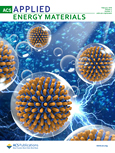
ACS Applied Energy Materials
Scope & Guideline
Pioneering Research for a Sustainable Energy Tomorrow
Introduction
Aims and Scopes
- Energy Storage Materials:
Research on various materials, including batteries (Li-ion, Na-ion, and solid-state batteries), supercapacitors, and hybrid systems, aimed at improving energy density, cycling stability, and overall performance. - Photovoltaics and Solar Energy:
Development of new materials and structures for solar cells, including organic photovoltaics, perovskite solar cells, and tandem systems, with a focus on efficiency and stability under varying environmental conditions. - Electrocatalysis and Fuel Cells:
Innovative approaches to enhance electrocatalytic performance for oxygen evolution, hydrogen evolution, and CO2 reduction reactions, along with the design of efficient fuel cell systems. - Thermoelectric Materials:
Exploration of new materials for thermoelectric applications, aiming to improve efficiency and reduce thermal conductivity for waste heat recovery and energy conversion. - Nanostructured and Composite Materials:
Utilization of nanostructured materials and hybrid composites to enhance electrical, thermal, and mechanical properties for various energy applications. - Sustainable and Green Chemistry:
Focus on environmentally friendly synthesis methods, recycling of materials, and the development of biodegradable energy storage systems.
Trending and Emerging
- Solid-State and Sodium-Ion Batteries:
Research on solid-state batteries and sodium-ion alternatives is gaining traction due to the need for safer, more efficient, and sustainable energy storage solutions. - Perovskite Solar Cells:
There is a significant increase in studies focusing on perovskite solar cells, emphasizing their efficiency, stability, and scalability in commercial applications. - Electrocatalysis for CO2 Reduction:
Emerging research on electrocatalytic processes to convert CO2 into valuable chemicals is trending, highlighting the importance of carbon neutrality and sustainability in energy conversion. - Hybrid Energy Storage Systems:
There is growing interest in hybrid systems that combine different energy storage technologies, such as supercapacitors and batteries, to achieve higher performance and versatility. - Advanced Materials for Thermal Management:
Research into new materials for effective thermal management in energy devices is emerging, focusing on enhancing performance and safety in high-energy applications. - Biomass and Green Materials:
An increasing number of studies are exploring the use of biomass and environmentally friendly materials for energy applications, aligning with global sustainability goals.
Declining or Waning
- Traditional Lithium-Ion Battery Research:
As the market moves towards more sustainable and advanced battery technologies, the emphasis on standard lithium-ion battery research is decreasing, with more focus on solid-state and sodium-ion batteries. - Conventional Photovoltaic Technologies:
Research on traditional silicon-based photovoltaic cells is waning as interest shifts to perovskite and organic solar technologies that promise higher efficiency and lower production costs. - Basic Theoretical Studies:
There is a noticeable decline in purely theoretical studies without experimental validation, as funding and interest increasingly favor research with direct practical applications and demonstrable outcomes.
Similar Journals

Journal of Power Sources Advances
Empowering Innovations in Energy TechnologyJournal of Power Sources Advances, published by ELSEVIER, stands at the forefront of innovative research within the fields of Electrochemistry, Energy Engineering and Power Technology, and Materials Chemistry. Having established itself as an Open Access journal since 2020, it aims to disseminate knowledge rapidly and widely among researchers, professionals, and students interested in the latest advancements in power sources technology. With an impressive impact factor and recognition as a Q1 journal in 2023 across multiple categories, it addresses key challenges and innovations in energy generation, storage, and materials development. The journal's commitment to high-quality, peer-reviewed content fosters a vibrant community for discussing breakthroughs that hold the potential to transform energy systems globally. The journal operates out of the Netherlands, enhancing its global outreach, while its strong Scopus rankings highlight its influential role in driving research within its scope. Journal of Power Sources Advances is the pivotal resource for those dedicated to shaping the future of energy sustainability and technology.

Solar RRL
Illuminating the path to energy efficiency and breakthroughs.Solar RRL, published by WILEY-V C H VERLAG GMBH in Germany, is a premier journal dedicated to advancing the field of solar energy research and technologies. With an impressive Q1 ranking across key disciplines—including Atomic and Molecular Physics, Electrical and Electronic Engineering, and Energy Engineering—this journal stands out as an authoritative source of high-impact research. Since its inception in 2017, Solar RRL has provided a platform for the dissemination of innovative ideas and findings, making vital contributions to the understanding of solar energy conversion, efficiency improvements, and sustainable technology. Researchers, professionals, and students seeking to stay at the forefront of solar energy advancements will find invaluable insights and rigorous studies in its pages. Although currently not an open-access journal, Solar RRL offers a subscription model that gives readers access to cutting-edge research that shapes the future of energy technology.
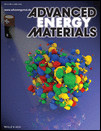
Advanced Energy Materials
Transforming Energy Research for a Sustainable TomorrowAdvanced Energy Materials is a leading academic journal published by WILEY-V C H VERLAG GMBH, focusing on the rapidly evolving fields of materials science and renewable energy technologies. With an impressive impact factor and recognition as a top-tier journal, it ranks within the Q1 category in both Materials Science (miscellaneous) and Renewable Energy, Sustainability and the Environment as of 2023. Spanning from 2011 to 2024, the journal serves as an essential platform for researchers, professionals, and students eager to explore groundbreaking advancements in energy materials, fostering innovative solutions to global sustainability challenges. The journal's authoritative content is supported by rigorous peer review, ensuring high-quality research contributes to the academic community and beyond. Located in Weinheim, Germany, Advanced Energy Materials stands at the forefront of scientific inquiry, making it an invaluable resource for those invested in the future of energy and materials science.
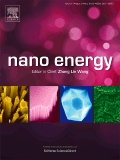
Nano Energy
Exploring the Future of Energy at the NanoscaleNano Energy is a premier journal published by Elsevier, focused on the dynamic intersection of nano-technology and energy solutions. Since its inception in 2012, this high-impact journal has made significant strides in advancing research across multiple disciplines, showcasing groundbreaking studies in Electrical and Electronic Engineering, Materials Science, and Renewable Energy. With an impressive Impact Factor that places it in the Q1 category of these fields—including a distinguished rank of #6 in Electrical Engineering and #9 in Renewable Energy on Scopus—the journal serves as a vital resource for academics and practitioners alike. Nano Energy aims to disseminate innovative research and developments that contribute to the sustainable energy landscape, thereby addressing pressing global energy challenges. Researchers and professionals seeking to stay at the forefront of nanotechnology applications in energy generation and efficiency will find this journal an indispensable platform for sharing knowledge and driving impact.

JOURNAL OF SOLID STATE ELECTROCHEMISTRY
Driving Progress in Condensed Matter and Electrochemical SystemsThe Journal of Solid State Electrochemistry is a leading peer-reviewed journal dedicated to advancing the understanding and application of solid-state electrochemical systems. Published by Springer, this prestigious journal has been a staple in the field since its establishment in 1997, with an impressive range of topics covering Condensed Matter Physics, Electrochemistry, and Materials Science. It holds a notable Q2 category quartile ranking in several disciplines, including Electrical and Electronic Engineering, and boasts significant Scopus rankings—ranked #28 in Electrochemistry, showcasing its credibility and impact in the field. With a mission to disseminate high-quality research and innovative methodologies, the journal aims to foster cross-disciplinary collaboration among researchers, professionals, and students. While not open access, articles published in the Journal of Solid State Electrochemistry are integral for those exploring cutting-edge technologies through theoretical and practical approaches, ultimately enhancing our understanding of energy systems and materials' performance. Located in Germany, the journal continues to thrive internationally, providing a robust platform for scholarly communication.
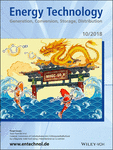
Energy Technology
Pioneering Insights into Renewable Energy AdvancesEnergy Technology, published by Wiley-VCH Verlag GmbH, is a prominent peer-reviewed journal dedicated to advancing the field of energy research and technology. With an ISSN of 2194-4288 and an E-ISSN of 2194-4296, this journal has made a significant impact in the energy sector, holding a Q2 category ranking in the Energy (miscellaneous) category for 2023, and proudly positioned in the 77th percentile within the Scopus ranking for General Energy. Since its inception in 2013, Energy Technology has consistently published cutting-edge research, innovations, and reviews that cater to a wide array of topics including renewable energy, sustainable technologies, and energy efficiency. The journal does not offer open access, yet it remains a key resource for researchers, professionals, and students who are committed to exploring the dynamic field of energy. The journal's efforts to disseminate rigorous scholarship make it an invaluable asset for anyone looking to contribute to or understand the future of energy-related technologies until 2024.

Materials Today Advances
Championing high-impact contributions in materials innovation.Materials Today Advances is a premier open access journal, published by Elsevier, dedicated to disseminating cutting-edge research in the fields of Materials Science and Mechanical Engineering. Since its inception in 2019, the journal has quickly established itself within the academic community, achieving an impressive Q1 quartile ranking in both disciplines as of 2023, indicative of its high-impact contributions. Ranked #25 out of 672 in Mechanical Engineering and #46 out of 463 in General Materials Science according to Scopus, Materials Today Advances offers rigorous peer-reviewed articles that address the latest innovations and interdisciplinary approaches. Researchers, professionals, and students can benefit from the journal's open access model, ensuring widespread visibility and accessibility of groundbreaking findings. With the convergence of advanced materials research and practical applications, this journal represents a vital resource for those at the forefront of scientific discovery.

Energy & Environmental Materials
Exploring the Nexus of Energy Efficiency and Environmental StewardshipEnergy & Environmental Materials, published by WILEY, is an esteemed academic journal dedicated to pioneering research in the multifaceted domains of energy, environmental science, and materials science. Since its inception in 2018, this journal has rapidly established itself as a leading platform, holding a prestigious Q1 ranking across multiple categories including Renewable Energy, Sustainability, and Waste Management, reflecting its significant contributions to advancing knowledge in these critical areas. With a robust Scopus ranking that positions it in the top percentile for Environmental Science and Materials Science, it caters to a diverse audience of researchers, professionals, and students seeking cutting-edge findings and practical applications in energy efficiency and sustainable materials. This open-access journal facilitates the dissemination of innovative research and aims to bridge the gap between scientific exploration and real-world solutions for a sustainable future. The editorial team encourages submissions that explore both theoretical and practical aspects, ensuring that every publication not only contributes to the academic landscape but also drives impactful change in energy and environmental practices.
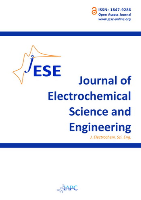
Journal of Electrochemical Science and Engineering
Catalyzing Progress in Electrochemical Science and Engineering.The Journal of Electrochemical Science and Engineering, published by the International Association of Physical Chemists (IAPC), serves as a vital resource for researchers and professionals in the fields of electrochemistry, materials chemistry, and chemical engineering. With an Open Access model since 2011, this journal ensures that groundbreaking research is freely accessible to a global audience, promoting collaboration and knowledge sharing. Situated in Croatia, it showcases cutting-edge developments while focusing on applied aspects related to electrochemical technologies. Notably, the journal holds a commendable Scopus ranking, placing it within the Q3 quartile for multiple categories, including Chemical Engineering (miscellaneous) and Electrochemistry. By fostering innovative research and comprehensive reviews, the Journal of Electrochemical Science and Engineering plays a crucial role in advancing the understanding and application of electrochemical processes, making it an indispensable platform for academics and practitioners alike.
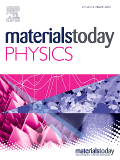
Materials Today Physics
Driving Progress in Interdisciplinary Materials ResearchMaterials Today Physics, published by Elsevier, is a prestigious journal that focuses on the interdisciplinary field of materials science, physics, and energy innovations. With an impressive impact factor and a Q1 ranking in three categories—Energy (miscellaneous), Materials Science (miscellaneous), and Physics and Astronomy (miscellaneous)—it stands out as a key platform for disseminating high-quality research. The journal, which has been in circulation since 2017, provides a vital resource for academics and industry professionals alike, facilitating the exchange of knowledge and driving advancements in materials research. Available in both traditional and open-access formats, Materials Today Physics aims to publish cutting-edge research articles that push the boundaries of material properties and their applications, thereby contributing to the development of sustainable technologies and energy solutions. With a commitment to excellence, this journal offers a robust avenue for researchers to share their findings with a global audience, making it an essential tool for those engaged in the rapidly evolving fields of physics and materials science.